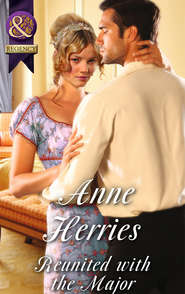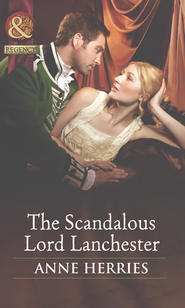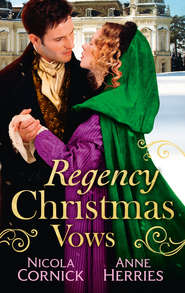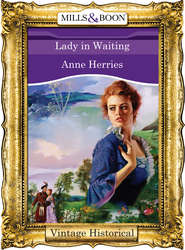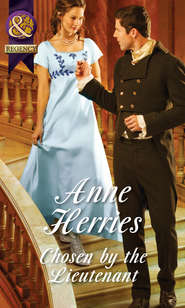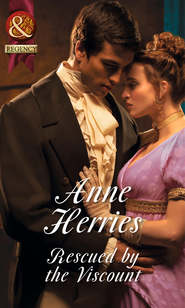По всем вопросам обращайтесь на: info@litportal.ru
(©) 2003-2024.
✖
The Rebel Captain's Royalist Bride
Автор
Год написания книги
2018
Настройки чтения
Размер шрифта
Высота строк
Поля
‘You are entitled to your own views, Babette—but it is best not to speak them in Sir Matthew’s house.’
‘Is my uncle of their persuasion, Aunt?’
‘I would not say that he was for Parliament. Sir Matthew is against any war that sets brother against brother and father against son. He cares for his land and would see it prosper. War is dangerous, Babette. Tempers rise and terrible things are said and done. As yet we have lived quietly here—but for how long can it continue? This is the first time soldiers have come to our door and they came in peace—but others may demand where Sir James requests. I think it will not be long before the whole country is aflame and then we shall all have to choose one way or the other.’
‘Yes, I know, Aunt.’ Babette was thoughtful. Her uncle had said little about the outcome of the first battle of the war at Edge Hill. The matter of who had won depended on whose side you supported, for some declared that it was a victory for the King, while others thought the men of Parliament might have won a decisive victory had they held on a little longer. In the months since that first battle there had been only minor skirmishes, indecisive clashes that had no real significance, small troops of opposing forces that met and fought. It had mainly been a time of recouping on both sides, of drawing lines and discovering who was your friend and who your enemy. ‘I know the castle of Haverston still stands for the King, but some houses are not as well defended and have fallen to the rebels.’
‘You ought not to name them so,’ her aunt chided her gently. ‘It shows your loyalty and may make you enemies. Sir Matthew has been careful not to choose sides publicly, though I think perhaps he may be drawn more to the side of Parliament, for he says they are the voice of the people.’
‘Surely his Majesty speaks for the people?’ Babette was puzzled. ‘Does the King not rule by divine right?’
‘It is certainly the King’s opinion and that of his followers,’ her aunt replied, ‘but I am not sure. Your uncle is not against the King. Far from it—but he would have his Majesty rule by the consent of the people.’ Lady Graham sighed. ‘Yes, I know, dearest, it is a puzzle to me, too. I know not what to think.’
Babette made no reply. Her uncle was a studious man and he often lectured them about theology and, it seemed, the rights of kings—at least he had confided these views to his wife.
She could not know whether her uncle was right or wrong. Certainly, she agreed with him that war was unfortunate. She’d heard that in some parts of the country marauding soldiers of either persuasion had commandeered grain, cattle and horses, leaving the owners without payment and in fear of their lives. Some who had fought for their possessions were left wounded or dying; it was indeed a bitter conflict that turned families against one another and set neighbours at war with each other.
‘I shall try to be careful, Aunt,’ she promised, ‘for I do not wish to bring trouble upon you and your family.’
‘I know that, dearest,’ Lady Graham said. ‘You have been a joy to me since you came here. Your cousin is still a young girl, though she does not like it to be said. I have found your company comforting, and you have helped me in so many ways. I should be loath to part from you—if your uncle decided that it was not suitable for you to remain here.’
It was the implication, the words left unsaid, that shocked her.
Would her uncle banish her to the castle? Babette’s heart sank. She much preferred life in this comfortable manor house to that in the bleak and often icy cold castle. The discomfort had never bothered her when her parents lived and her brother was at home, but without them it had become a lonely place indeed and she had no wish to return. Her days had been busy at the castle, but the nights were long and gave her too much time to remember and regret. She would take her aunt’s warning seriously and watch her tongue, especially when her uncle was near.
Babette wondered if the Parliament man would complain of her to his cousin. As she helped Aunt Minnie wash and preserve the plums she’d picked earlier in the huge iron pan of sugar syrup, she contemplated the idea of being banished to her home. She would miss her aunt and her cousin very much. Hearing the heavy tread of her uncle’s step, she tensed, fearing his anger. However, when he entered the kitchen he was smiling.
‘Ah, there you are, Babette,’ he said, ‘helping your aunt like the good girl you are. Would you take more ale to the parlour, please? I have invited Sir James to stay with us for a few days. His men are on a mission to purchase cattle and horses and I have told him that I will help him, though I will not have my neighbours robbed.’
‘Will they sell to Parliament forces?’ Babette said and wished she had not as she saw her uncle frown. ‘Forgive me, Uncle. It is not my place to question.’
‘It was a pertinent question, Niece,’ he said and sighed heavily. ‘Because of our relationship, Sir James is willing to bargain for what he wants—though I fear that others may not be so nice. Both sides are taking what they want, Babette. If we wish to survive and see our neighbours prosper as we do ourselves, we must tread carefully.’
‘Yes, sir. I understand that,’ she replied. Her uncle was sometimes stern and sombre, but she saw that he was a good man at heart. He had not chosen to fight and some might look askance at him for that, but she knew that all he wished for was a quiet life in which to nurture his land, care for his family and be on good terms with his neighbours—but for how long would he be allowed to live as he preferred?
Babette picked up a jug of ale and went back to the parlour, hearing her aunt and uncle begin to talk in low voices as she closed the door. She’d feared that their visitor might have complained of her, but it was obvious that he had not for her uncle was not cross with her. He was generous at times, but also superstitious and often stern. He would have no mistletoe or greenery in the house at Christmas for it was a pagan custom and, he said, a tool of the Devil, the custom of kissing beneath a bough immodest.
Sir James was standing by the window, looking out into the garden as she approached. His view was of a small courtyard garden set with flowers of all kinds: damask roses, daisies, the remains of the gillyflowers, lilies and sweet-scented stocks, which were fodder for the bees that lived in their hives and supplied them with wonderful honey.
‘Your ale, sir.’ Babette set down her tray and was about to move away when he turned and looked at her. For a moment she was shocked by the haunted expression in his eyes and once again her heart caught. He looked so grief-stricken and for a moment she saw a different man. What could have caused that look?
‘Who tends your garden, mistress?’
‘I do most of it, though Jonas helps me when I need some heavy digging.’
‘Your hives do well?’
‘Yes, sir. Very well.’ She poured some ale into his cup, noticing that he had eaten most of the food she’d brought for him. ‘Have you eaten sufficient?’
‘Quite sufficient, mistress. My compliments to your aunt—that apple pie was delicious.’
‘I made it...’ Babette said and then blushed, for he would think she was asking for praise. ‘My mother taught me. She was a wonderful cook—and my aunt likes me to make pies for her.’
‘I see...’ There was a faint smile in his eyes now. ‘Is your mother dead, mistress?’
‘Yes, sir, these three years past of a fever.’
‘And your father?’
‘He died last year. I came to live here with my aunt because it was lonely without them.’
‘Sir Matthew tells me that your brother is Lord Harvey—but none knows if he lives?’ Sir James looked at her curiously. ‘Is your uncle your guardian?’
‘Nay, sir. His Majesty appointed the Earl of Carlton the custodian of the castle and my portion. I suppose either he or the King himself would be my guardian until my brother can be traced.’
‘Ah...’ He nodded, frowning again. ‘So that is where your Royalist persuasion came from. I thought it odd, for my cousin is surely of a different persuasion, even though he chooses not to take up arms.’
His eyes were cold as they went over her and yet a fire seemed to leap at their heart. Babette’s stomach clenched, for this man affected her more than she cared to admit. He was arrogant and an enemy, and this feeling in her stomach must be fear, though she was not usually so easily intimidated. Yet what else could cause her to tremble inwardly?
Babette set her lips primly. It was not for her to say why her uncle had not chosen for one side or the other. Her uncle’s views were his and he had no doubt made as much known to his cousin as he wished.
‘You are not betrothed?’ Sir James asked, bringing a betraying flush to her cheeks. ‘Your uncle said it had not yet been thought of.’
‘I see no reason why you should wish to know that,’ Babette said, raised to a quick anger by his impertinence. He had no right to question her on such a subject. ‘My father was to have arranged a betrothal just before he died—to Andrew Melbourne.’
‘Lord Melbourne’s son?’ His gaze narrowed. ‘Drew is my cousin once removed. I descended through the female line, but one of my ancestors was a Melbourne—her name was Catherine. Drew was once my good friend, but we have not spoken since before the Battle of Edge Hill. I regret the breach, for we were once good friends, but it was inevitable.’
‘Drew is for the King, of course.’ Babette’s head went up, her stance certain and proud.
‘Yes.’ Sir James looked at her, a brooding expression in his eyes. ‘Have you heard from him since your father died?’
‘No.’ Babette licked her lips nervously. It was one of the reasons she had cried herself to sleep each night before she came here. Although she had only met the handsome young man once, she had been excited by the thought of marrying him. She had thought he would come to the castle to claim her when he heard of her father’s death, but he had not. Indeed, she’d heard nothing of him since that date and supposed that he considered himself free to marry where he chose, since the betrothal had not actually happened.
‘I thought not,’ James said, a strange look in his eyes. She thought that he had more to say, but withheld it for some reason of his own. If he had news of Drew, in his arrogance he would not tell her. ‘Thank you for your ale, mistress. Your uncle has said that I may use the blue chamber while we stay here. I trust my presence in the house will not cause you sleepless nights?’
‘Should it?’ She frowned at him, annoyed that she had told him more than she’d intended of her life. He was an enemy and nothing to her, nor could he ever be. ‘I see no reason why your presence should make any difference to my life.’
‘Indeed, it should not,’ he replied, a smile playing across his mouth. She wondered why her eyes were drawn to his mouth. It was not as if he was likely to kiss her. Why had that thought entered her mind? Babette was horrified. She did not wish any man to kiss her unless he was her husband—and she certainly would not wish to marry a Puritan, though perhaps this man was more a soldier than a man of religious fervour.
This was ridiculous! Her heart was racing wildly and her cheeks burned as the foolish thoughts chased through her mind.
Babette withdrew her eyes hurriedly, collecting the empty plates and jug on to her tray. She picked it up and left before he could speak again. He had gone back to his contemplation of the garden and she sensed a heaviness in his mood that intrigued her.
Why should the contemplation of her garden make him sad? She was sure that he hid a secret sorrow behind that mask of indifference but could not imagine what it was—or why her garden should remind him.
* * *
James continued to gaze into the garden after the girl had left him. His mind was confused, for on first seeing her something had arrested his speech, suspending his thought for an instant that seemed like an aeon of time, and taking his breath. What it was about the young woman that should render him so he could not tell. He had believed he could never feel any true human emotion again, certainly not the softer feelings that he’d known when his sweet Jane was alive.






